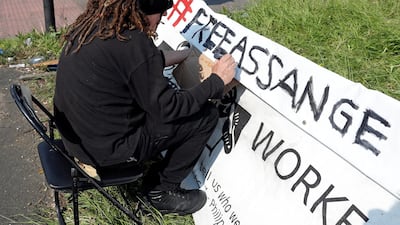The United States gave secret assurances to Ecuador that Julian Assange would not face the death penalty if he was extradited to the country in secret diplomatic exchanges that preceded his arrest in London last week.
Sweden's ambassador to the UK told The National that his country was not involved in the extradition battle around the WikiLeaks founder as questions continue to swirl over where the hacker turned activist will face justice.
"As of today, there's no Swedish involvement. There might be if the prosecutor decides to reopen the case," Torbjörn Sohlström said in an interview.
“We will have to see how the judicial process evolves.”
Sweden dropped a rape investigation into Mr Assange in 2017 because prosecutors said they were unable to take the case further while the Australian national was holed up in the Ecuadorian embassy. A second investigation into unlawful coercion and molestation was dropped in 2015 because it ran out of time.
But after Mr Assange had his diplomatic asylum revoked and was subsequently detained by British authorities, Sweden announced it was considering reopening the rape probe. However, the country is yet to issue the European arrest warrant needed to seek his extradition.
Meanwhile reports surfaced on Tuesday alleging that Ecuador had been engaging in backchannel negotiations with the US and Britain for about a year to try and get the 47-year-old out of the embassy he had been holed up in since 2012.
Relations between Ecuador and the Mr Assange began to sour around 2018 following the election of a new president, Lenín Moreno. Mr Moreno’s predecessor Rafael Correa had supported the case for allowing Mr Assange refuge.
Ecuador claimed it had spent $10 million on housing Mr Assange during his seven years in its embassy in the Knightsbridge district of the British capital. The embassy also had to move its staff into different buildings to accommodate Mr Assange’s requests for more space.
Growing fed up of their guest’s extended stay, Ecuador decided they wanted him out but – as a country opposed to the death penalty – knew they would face criticism if Britain then decided to send him to the US.
Mr Assange’s lawyers claim if he is extradited to the US, he could face the death penalty for allegedly leaking hundreds of thousands of secret US diplomatic cables in 2010.
The south American nation first asked Britain for written assurances that Mr Assange would not be extradited to any country where he would face the death penalty.
The Ecuadorian president was sent letters by two senior British officials, who assured him that the UK would not grant an extradition request unless adequate assurances have been given that that person will not be subject to capital punishment.
The first letter was sent by then foreign secretary Boris Johnson in March 2018 and the second was sent by his successor Jeremy Hunt in August 2018.
Published by The Guardian, both letters reference Ecuadorian concern about Julian Assange and add that under British law extradition cannot be ordered “unless the Home Secretary has first received an adequate assurance from that country that the death penalty will not be imposed or carried out”.
A senior US official told ABC news that Ecuador had sought additional reassurances around September 2018 from the Trump administration that Mr Assange would not face the death penalty.
The news station said that the US ambassador to Germany Richard Grenell, an ally of US President Donald Trump, had given his Ecuadorian counterpart in Berlin, Manuel Mejia Dalmau, a verbal assurance that Mr Assange would not be put to death.


